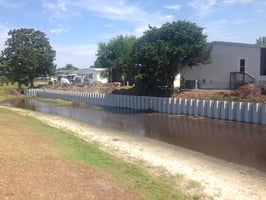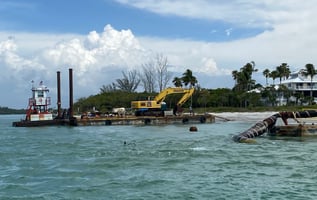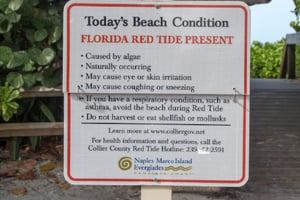Seawalls protect coastal property from destructive water and waves, preventing erosion and the loss...
Effective Seawall Construction Tips
The construction of seawalls is an excellent way to protect your property from the dangers of sea erosion, storm surges, and other similar seawall issues. They also serve as a proper retaining wall for natural ponds or lagoons where water tends to escape. Whether you’re planning on constructing a seawall on your property or just want to learn more about this construction project, this article will give you the information you need. Construction of seawalls is not necessarily complicated; however, it does involve unique challenges that are not present in other types of construction projects. If you want to know how to effectively construct a seawall on your property, continue reading for some helpful tips.

Seawalls are hard-engineered structures designed and installed to protect the coastline from wave and tidal erosion.
Research the seawall construction process.
Before you even start planning for construction, you’ll want to know the general seawall construction process. The general process for seawall construction is as follows:
- Site Assessment - You’ll want to begin by identifying the aspects of your site that the seawall needs to account for. For example, you’ll want to look into the soil conditions, the grade of the land, and the distance from the existing water.
- Design - Prepare a design of your new seawall. This can be done by hiring a professional engineer or architect, or you can do it yourself if you have the necessary experience.
- Obtaining the necessary Permits - You may need to obtain permits to begin construction. Be sure to check with your local government to see how you can go about obtaining a permit for your project.
- Construction - After you get the necessary permits, it’s time to begin your seawall construction!
- Final Inspection - After you’ve completed construction, you’ll need to schedule a final inspection with the government to confirm that your seawall meets all the necessary regulations.
Florida's most common seawalls are constructed of concrete slabs, vinyl, steel, or marine-grade wood. Other types include concrete blocks that are placed and filled.
There are several types of seawalls:
- Sheet- Sheet seawalls are built out of single panels made from wood, concrete, vinyl, or steel
- Vertical curved- Vertical curve seawalls are typically constructed from concrete and deflect and absorb wave energy better.
- Stepped- A stepped sea walls are shaped like steps and start low near or in the water and elevate as they descend into the coastline.
- Mound- Mound seawalls are typically constructed by stacking both small and large boulders creating a mound to protect the coastline
- Gravity - Gravity seawalls are placed where strong soils exist and are designed to resist forces. The seawall is anchored, using this healthy soil as a foundation. These walls are susceptible to shearing around the base, a process in which internal structure components move across each other in response to stress.
- Moment - A moment seawall is designed to resist lateral forces, such as pushing the wall outward.
- Combination - A combination seawall is designed to resist both forces.
- Stacked - Stacked seawalls are a type of structure typically built out of wood or concrete blocks stacked vertically.
Be aware of environmental considerations.
Depending on where you’re planning to construct your seawall, there may be specific environmental considerations you’ll need to consider. Some areas have stricter regulations than others, so you’ll need to check with your local government to see what seawall requirements you need to follow. When designing your seawall, you’ll also want to account for the natural wildlife in the area. You don’t want your seawall to be an impassable barrier that prevents animals from moving freely.
Hire a professional contractor.
There are many seawall contractors in your area. However, not all of them are reliable or trustworthy. Before you choose a contractor to build your seawall, you’ll want to make sure that you do your research and hire a professional contractor with a good track record. When choosing a seawall contractor, there are many things to consider:
- Reputation - You’ll want to see if there are any reviews or ratings for the contractor you’re considering. You can find this information online or ask your friends or family members if they have any recommendations.
- Licenses and permits - Ensure the contractors you’re considering are properly licensed and permitted to work in your area.
- Insurance - Ensure that the contractor you hire has insurance if anything goes wrong.
- Cost - You’ll want to ensure that the contractor you hire will charge a fair and reasonable price for their work.
- Timeliness - Make sure the hired contractor will finish the work promptly.
Ensure you have the necessary permits.
You will need to obtain permits before you can start construction. Be sure to hire a professional or check with your local government to see how you can go about obtaining a permit for your project. In Florida, several types of permits are required. You will need a permit or an exemption from the Department of Environmental Protection and a permit from the Corp of Army Engineers. Once these two permits are obtained, you must apply to your local County government for a construction permit. If you fail to obtain the necessary permits, you may have to tear down your seawall or face hefty fines or even jail time in extreme cases. If you follow these tips, you’ll be well on effectively constructing a seawall on your property. Seawalls are an excellent way to protect your property from erosion and damage, and they are an attractive addition to any landscape.
With the right contractor and proper planning and preparation, you can successfully construct a seawall that will last for years.
At Precision Marine Construction, our professionals can assist you with every aspect of evaluation, design, permitting, and construction to ensure your project is designed and then appropriately constructed. Contact Precision Marine Construction at 941.924.6044 with any questions.




Blog comments